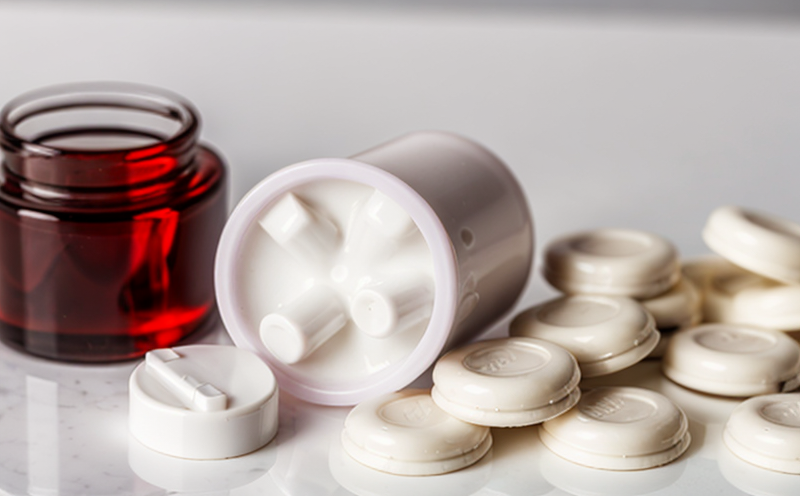USP Bioburden Testing of Solid Dosage Forms
In the pharmaceutical industry, ensuring product safety is paramount. USP bioburden testing of solid dosage forms plays a critical role in safeguarding patient health by identifying and quantifying viable microorganisms present on or within the medication.
The United States Pharmacopeia (USP) provides specific guidelines for bioburden testing under USP General Chapter 71: Microbial Limits Testing. This chapter is designed to ensure that solid dosage forms meet stringent microbial and fungal limits. The bioburden test helps manufacturers understand the risk of contamination, which can be a significant concern for oral solid dosage forms.
The process involves several steps including sample collection, preparation, inoculation into appropriate media, incubation, and enumeration or identification of viable microorganisms. This testing is particularly important in ensuring that the product does not pose any health risks to patients who may have compromised immune systems.
Bioburden testing also helps pharmaceutical companies comply with regulatory requirements such as those set by the US Food and Drug Administration (FDA), European Medicines Agency (EMA), and other global bodies. Compliance is crucial for maintaining market access and consumer trust.
The testing procedure follows a standardized methodology outlined in the USP, which ensures consistency across laboratories. This standardization helps to prevent discrepancies that could arise from differing interpretations or practices.
Understanding the bioburden levels of a solid dosage form can inform decisions on sterilization processes, raw material selection, and packaging design. It also aids in process optimization and quality assurance initiatives aimed at reducing contamination risks.
The results of bioburden testing are reported based on colony-forming units (CFUs) per gram or milliliter. These data points help manufacturers make informed decisions about their production processes and product formulations, ultimately contributing to safer medications for patients worldwide.
Scope and Methodology
The scope of USP bioburden testing encompasses various types of solid dosage forms such as tablets, capsules, granules, powders, and suppositories. This service is particularly relevant when these products are exposed to environmental conditions that could introduce microbial contamination.
- Sample Collection: Samples are typically collected from the manufacturing site or storage areas where there is a risk of microbial growth.
- Inoculation Media: The samples are inoculated into media suitable for cultivating bacteria, yeasts, and molds.
- Incubation: The inoculated samples undergo an appropriate incubation period to allow the microorganisms to grow.
- Enumeration: After incubation, the colonies on the media are counted. This count represents the bioburden of the sample.
The methodology adheres strictly to USP Chapter 71, which specifies the types of media and incubation conditions needed for accurate results. The use of standardized methods ensures that all laboratories performing this test adhere to the same rigorous standards.
For more complex samples or those with unusual microbial flora, additional steps may be required, such as using selective media or employing advanced analytical techniques like mass spectrometry for species identification.
Eurolab Advantages
At Eurolab, we pride ourselves on providing comprehensive pharmaceutical testing services tailored to meet the highest quality standards. Our expertise in USP bioburden testing of solid dosage forms is unmatched, thanks to our highly skilled scientists and state-of-the-art facilities.
We offer a range of benefits that make us the preferred choice for pharmaceutical companies:
- Comprehensive Testing Capabilities: Our laboratories are equipped with advanced instrumentation capable of detecting even low levels of contamination.
- Experience and Expertise: Our team of scientists has extensive experience in conducting bioburden tests across various industries, ensuring accurate and reliable results.
- Regulatory Compliance: We ensure that all our testing methods comply with the latest USP guidelines and other relevant regulations worldwide.
- Quick Turnaround Time: Our streamlined processes allow for rapid turnaround of test results without compromising on quality.
We also offer value-added services such as interpretation of bioburden data, recommendations for process improvements, and assistance with regulatory submissions. These additional services help our clients stay ahead in a competitive market while maintaining the highest standards of product safety.
Our commitment to excellence is reflected in the consistent accuracy and reliability of our test results, which are critical for making informed decisions about your products' safety and efficacy.
International Acceptance and Recognition
- FDA Acceptance: The USP bioburden testing is widely accepted by the FDA as part of their regulatory framework for ensuring drug product quality.
- EMA Approval: The European Medicines Agency also recognizes this test, making it a standard requirement in Europe.
- World Health Organization (WHO): WHO guidelines recommend that pharmaceutical products undergo bioburden testing to ensure they meet international standards of safety.
- Australian Therapeutic Goods Administration (TGA): TGA also requires USP bioburden testing as part of its regulatory compliance processes.
- Japanese Pharmaceuticals and Medical Devices Agency (PMDA): PMDA mandates that all imported pharmaceutical products undergo this test before market release.
The recognition by these major regulatory bodies underscores the importance of USP bioburden testing in maintaining global standards of pharmaceutical product safety. By adhering to these rigorous testing protocols, manufacturers can ensure their products meet international quality and safety criteria.





